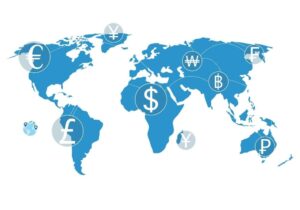If you’ve a Cash App on your smartphone, then you must be using it often to split a dinner bill or pay a restaurant bill.
Cause it’s super-fast and offers robust security, it’s been users’ favorite for over a decade now.
While other apps charge a hefty fee and may lack solid features to satiate users’s interest, Cash App emerges out to be the best comrade for managing everyday Peer-to-peer payments.
So, we all wonder which banks it works with and how reliable it is when it comes to direct deposits.
So, without any further ado, let’s untangle the puzzle of Cash App’s Banking partners and make sense of it all in a way that feels like a chat over coffee.
What is Cash App?
First off, Cash App isn’t a bank. It’s a fintech company designed to make your life easier when sending, receiving, and managing money.
Akin to a super-smart assistant who handles your transactions while partnering with real banks to do the heavy lifting.
This setup allows Cash App to focus on creating a slick, user-friendly app while leaning on established banks for the security and financial infrastructure.
So, which banks does it use? Cash App primarily works with three key players: Lincoln Savings Bank, Sutton Bank, and Wells Fargo.
Each of these banks has a specific role: They ensure your money is safe, your Cash Card works like a charm, and your direct deposits go smoothly.
Let’s break it down and see how these banks fit into the Cash App puzzle.
What is the Cash App Bank name?
Lincoln Savings Bank: The Direct Deposit Dynamo
If you’ve already set up direct deposit on Cash App to get your paycheck early, you’ve got Lincoln Savings Bank to thank.
This Iowa-based bank, around since 1902, manages Cash App’s direct deposit services. So, when your payroll manager or employer sends your paycheck to your Cash App account, it arrives in an account backed by Lincoln Savings Bank.
It provides a $250,000 FDIC fund coverage, in case your Cash is lost due to bank failure or stolen.
What’s more?, Lincoln Savings Bank works with Plaid, a financial tech company that makes it easier to connect your Cash App account to other apps or services.
So, whether you’re linking Cash App to a budgeting tool or another financial platform, Lincoln Savings Bank is the lifesaver.
Sutton Bank: The Cash Card Creator
Do you have a Cash Card? If yes, it’s issued by the Sutton Bank. You know, the one you can customize with doodles or make glow in the dark? That’s the expertise of Sutton Bank, a community bank based in Attica, Ohio.
Sutton Bank issues the Cash App Card, a Visa prepaid debit card that you can link straight to your Cash App balance.
So every time you pay with your Cash Card at a restaurant or use it online, Sutton Bank processes those transactions.
The best part is that it offers an FDIC insurance of up to $250,000, akin to Lincoln Savings Bank.
This collaboration is quite helpful as it lets you use your Cash App balance in the real world.
Wells Fargo: The Insurance Protector
Undoubtedly, Wells Fargo is one of the biggest names in U.S. banking, with over 4,000 branches and 13,000 ATMs across 50 states.
It backs your Cash App balance by providing you with an FDIC-insured fund of up to $250,000. However, this perk is only valid for Cash Card holders.
Why does it matter? FDIC insurance gives peace of mind when something catastrophic happens, like a bank failure—your money is safe.
However, if you don’t register a Cash Card, your Cash App balance won’t get any FDIC insurance. So you must sign up for the Cash Card to leverage all the benefits of the banks that Cash App works with.
How These Banks Work Together
You might want to know how these banks actually work together and why you can’t get the job done by only a single bank. That is not as complicated as it sounds. So here’s how it all comes together to help you:
- Lincoln Savings Bank handles your direct deposits and other banking services, ensuring your paychecks arrive on time.
- Sutton Bank provides a Plastic Prepaid Cash Card that you can use as any debit card to pay bills or shop anywhere in the World where Visa is accepted.
- Wells Fargo Shield for your Cash Card balance by providing you with the FDIC insurance up to $250,000.
So, when you pay your bills, send cash to your loved ones using your Cash card; these banking partners take care of everything.
Why Does Cash App Use Multiple Banks?
Since, the Cash App is not a bank, it’s a fintech company that doesn’t have any physical branches. So to provide services to its users, it needs to work with a couple of banks.
Unlike traditional banks, it supports multiple banks, credit, or debit cards to send and receive money almost instantly. It’s easy to set up, making a person-to-person transaction smooth.
To handle direct deposits, issue debit cards, and ensure a backup money, it works with multiple banks to enhance capacity and reliability.
Is Cash App Safe?
Undoubtedly, it’s the best app for peer-to-peer transactions in the U.S. But akin to Venmo or Zelle, it can be a scary experience for some gullible users.
So, enabling two-factor authentication can keep imposters or fraudsters miles away from reaching your Cash.
Other steps you can take to secure your account are by not sharing your login details with anyone, or not clicking on any suspicious links received in your email.
So, now, should we trust the Cash App banks? The short answer is yes, but let’s know why.
All three banks—Lincoln Savings Bank, Sutton Bank, and Wells Fargo—offer an FDIC-insured fund, which is a good sign for cardholders or paycheck recipients.
Cash App has robust security features, like encryption, fraud detection, and security locks.
So, when you send cash or make a payment, your data is encrypted and won’t be shared or stolen.
Anyway, Similar to any other P2P apps, if you send money to the wrong person, it’s quite tough to reverse it unless the recipient refunds you.
So, before hitting a pay button, double-check all the details, so you don’t have a bad experience with the app.
Do You Need a Bank Account To Use Cash App?
The short answer? No. The platform doesn’t require a bank account to receive payments from other users. But the caveat is you can’t pull out your funds without a bank account.
So there are more perks with adding your payment source than using the app without it.
No problem, if you’re unbanked, the platform offers a physical prepaid Visa debit card, called Cash Card, making the app work more like a bank.
Using a Cash card, you can make withdrawals and spend your Cash app balance like a debit card.
Interestingly, you can top up your account balance via participating stores like Walmart or 7-Eleven, for a small fee.
Also, you can deposit checks through the Cash App routing number and use those funds to send money, withdraw, or shop online.
However, to make cashing in and out more smooth and safer, we suggest linking your bank account.
How does Cash App work?
The platform is not limited to sending and receiving cash, it has some surprising elements that attract users towards it.
- Cash Card: The most useful offering is its customizable debit card that lets you spend your Cash App balance at merchants that accept Visa.
- Direct deposits: Got a salaried job? But tired of getting your paycheck on time? Well, the app sends your paycheck up to two days early.
- Trade Bitcoin: Another cool feature it offers is investing in Cryptocurrency. So, if you are a crypto trader, you must have a look at it.
- Invest in stocks: It lets you invest in stocks with as little as $1.
- File taxes for free: Got taxes to file? Cash App also lets you do that. Using the tax file, you can file your federal and state returns at no cost.
- Boosts: You don’t wanna miss that feature. The platform lets you rack up discount points on shopping at your favourite stores and restaurants. The only condition to use Boosts is that you should’ve a Cash Card.
What may bother you?
In January 2025, the company got an order by the Consumer Financial Protection Bureau (CFPB) to pay $175 million in penalties for putting users at risk with weak security protocols.
The CFPB investigated issues like incomplete inquiries into unauthorized transactions and a lack of customer service.
Block has since committed to improving its security and customer support, including setting up 24/7 live-person customer service and better dispute resolution processes.
Further, state regulators fined Block $80 million for issues related to anti-money laundering compliance.
Block has reacted by injecting heavily in its compliance programs to rectify its mistake.
While these incidents might sound concerning, they show that Cash App is under scrutiny and working to fix its flaws, which is a good sign for users like you.
However, if the platform fixes its flaws and enhances the security across the board, users will get more power.
How to Find Your Cash App Bank Details?
It’s no brainier to find out your Cash App bank details when you’re setting up your direct deposit.
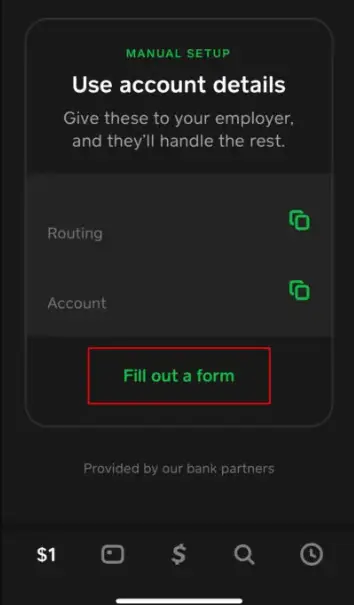
Simply, go to the Account & Routing tab, and you’ll see your account and routing numbers.
These are tied to Lincoln Savings Bank for direct deposits or Sutton Bank for your Cash Card.
If you’re setting up direct deposit with your employer, you can share these numbers to get your paycheck sent straight to Cash App.
Why This Matters to You
To know where your money is, or is protected or not, you must understand the Cash App banks.
The trio, Lincoln Savings Bank, Sutton Bank, and Wells Fargo, are all well-known, FDIC-insured institutions, and their association with Cash App means you’re funds are safe and sound.
Plus, knowing how to get your paycheck early with the platform with Lincoln Savings Bank is very important.
And if you need a physical debit card to make purchases? You can count on a Cash Card through Sutton Bank.
In terms of protection money coverage of up to $250,000, Wells Fargo has your back.
Wrapping It Up:
Cash App makes managing money feel effortless, but it’s the banks behind the scenes—Lincoln Savings Bank, Sutton Bank, and Wells Fargo—that keep the wheels turning.
They handle everything from direct deposits to debit card transactions to FDIC insurance, so you can focus on what matters: sending money to friends, treating yourself, or saving for the future.
We hope this guide has answered your question, “What bank does Cash App use?” and given you a clearer picture of how it all works.
If you’re new to Cash App or a seasoned user, take a moment to appreciate the teamwork between this fintech gem and its banking partners.
It’s a partnership that’s all about making your financial life easier, safer, and maybe even a little more fun.
Got more questions about Cash App or its features? Drop us a line, or check out Cash App’s help center for the latest info.
And next time you send a payment or swipe your Cash Card, give a little nod to the banks making it possible. They’re the unsung heroes of your financial adventures.

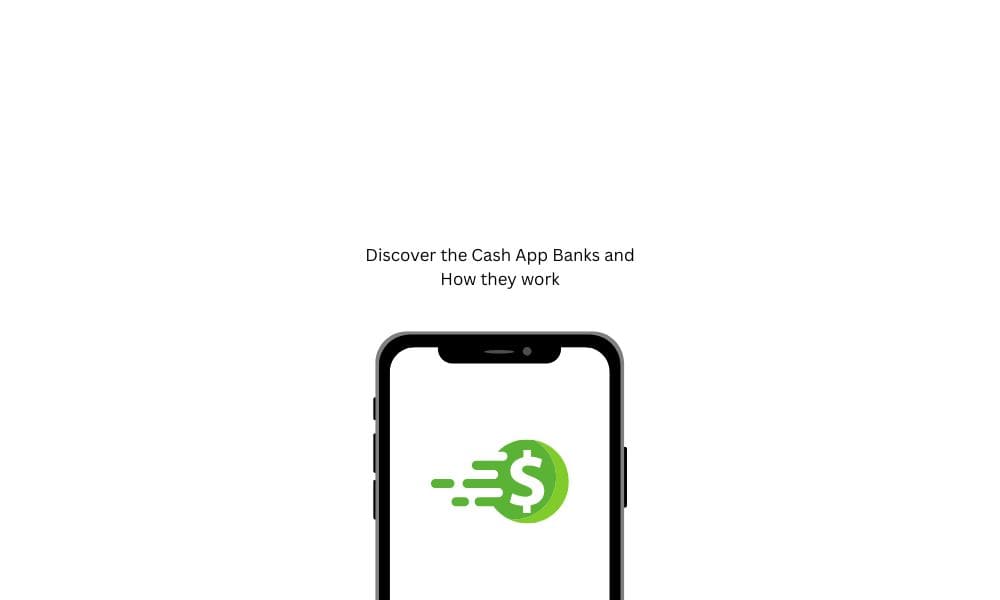
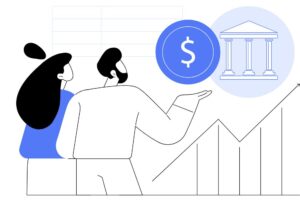
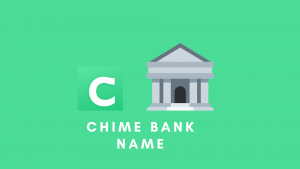
![How to Borrow Money From Chime 2025 [Guides] borrow money from chime](https://www.theappflow.com/wp-content/uploads/2022/08/borrow-money-from-chime-min-300x169.jpg)
